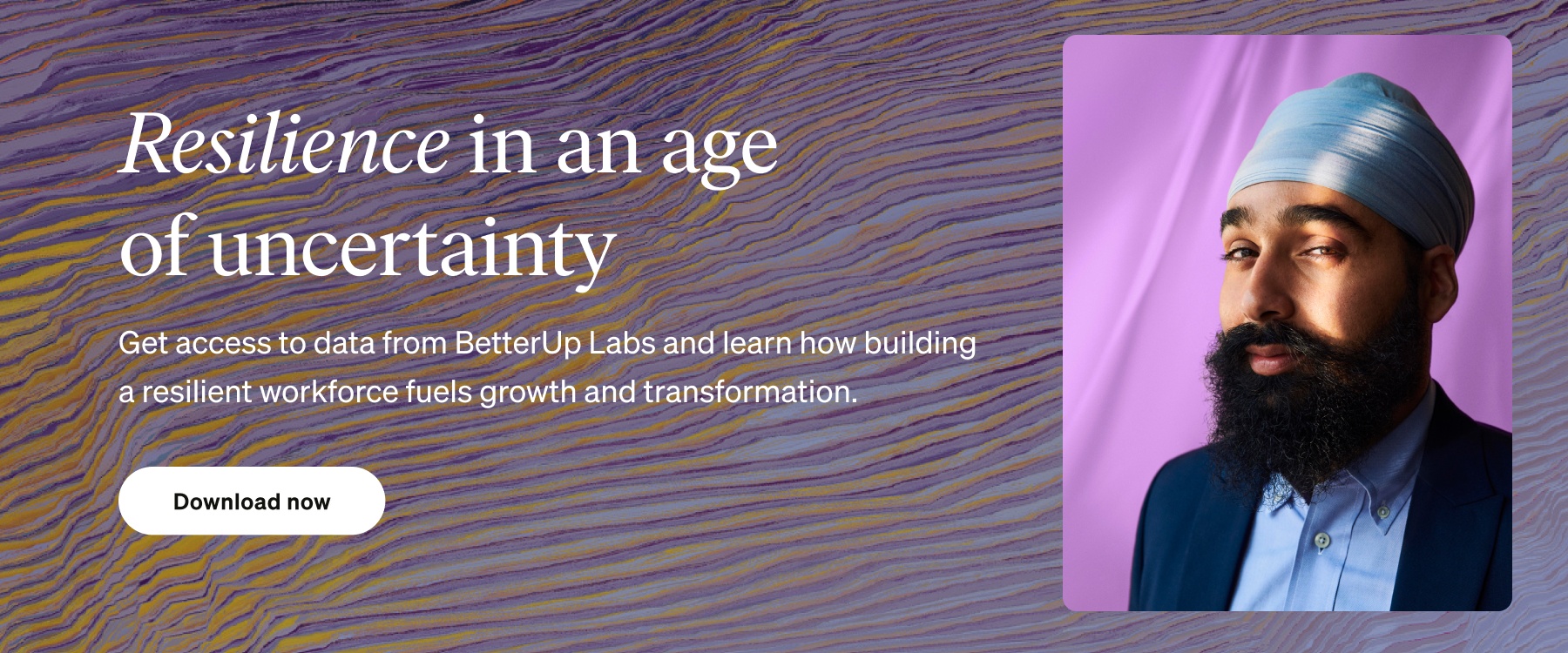
Remember at the start of the pandemic when toilet paper was in such high demand that stores had bare shelves? Highly efficient industries like the toilet paper industry are great at delivering a standardized product at consistent, high levels of productivity.
What are they less great at? Agility.
With large factories, global supply chains, and tightly defined processes, they’re not designed for disruption and change. Highly efficient supply chains couldn’t pivot quickly. Productivity took a hit and the higher demand was left wanting. In other words, highly efficient systems can have a costly lack of resilience.
Humans aren’t that different. If we focus on becoming overly efficient at work it is often at the expense of our resilience. We compromise our ability to adapt and change in the face of new stressors and disruptions.
I experienced this trade-off first hand when I started a full-time role at BetterUp while still finishing up my Ph.D. program. I was operating at max productivity. I had optimized nearly every aspect of my life to do so. Very quickly I hit a wall. I was feeling burnt out, less able to focus, and could feel my overall productivity slipping at a time when it was most critical to my success. I had used up all of my stock of psychological resources by overinvesting in work output and was running on empty.
We know that the pandemic tested the resilience of supply chains – and many struggled to bounce back and keep up with consumer demand. But what about humans?
What the data say
BetterUp Labs set out to understand the impact of the COVID-19 pandemic on productivity, tracking 1,185 individuals from pre-pandemic to after the pandemic was declared and lockdowns began and other restrictions were in place. We also explored whether coaching could reduce the impact of the pandemic’s disruption on productivity.
We compared data from two groups. The first group received BetterUp coaching before and during the beginning of the pandemic. The second group did not have access to BetterUp coaching and did not report any other coaching before or during the pandemic.
We hypothesized that we would see a sharp reduction in productivity for both groups in comparison to the pre-pandemic levels. Indeed, uncoached participants experienced a substantial decline (-20%) in productivity. But the group that had coaching was different. We found that the coached group, on average, improved (+6%) their productivity.

Not only did those with coaching avoid major loss in productivity, people with a Coach actually made gains in productivity despite the enormous challenges from a global pandemic.
Combining this finding with the fact that when Members are experiencing major changes at work, they actually grow more than those who are not going through change, it is clear that with the right support, individuals can continue to improve performance and achieve personal growth in even the most difficult of circumstances.
Why it matters
These results suggest that even in times of crisis and massive change, it is feasible to maintain and even improve productivity.
So, how does coaching play a role? Coaching helps people develop more flexible, resilient personal supply chains and avoid over-indexing on one factor — optimizing for efficiency — at the expense of other important factors.
Coaching can help build resilience and other psychological resources for mental fitness through reframing techniques, providing social support, and supporting the development of an individual’s strengths. Resilience can operate as a buffer to stress and change, reducing the negative impact of those changes on productivity. In other words, resilience helps make sure your “psychological resource supply chain” is robust to any unexpected disruptions.
Coaching can also help establish durable levels of efficiency by encouraging self-awareness, self-compassion, and self-care. Setting a steady pace, rather than over-optimizing for efficiency, reduces the risk for burnout and subsequent losses in productivity. In fact, we have found that, within our Whole Person Model, self-compassion is the second strongest predictor of productivity.
Building any system – from a macro one like supply chains or a micro one like personal productivity strategies – solely for efficiency can make them rigid and unsustainable. Instead, to maximize performance long-term, a focus on efficient and effective outcomes must be combined with an equal focus on resilience and adaptability. Investing in building the right mindsets and abilities to be resilient is what differentiates those with sustained productivity through change from those without.







